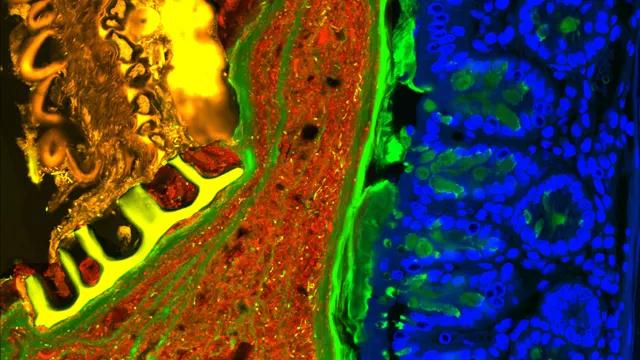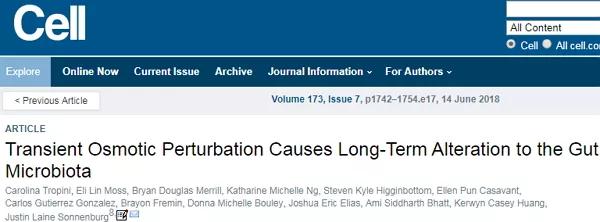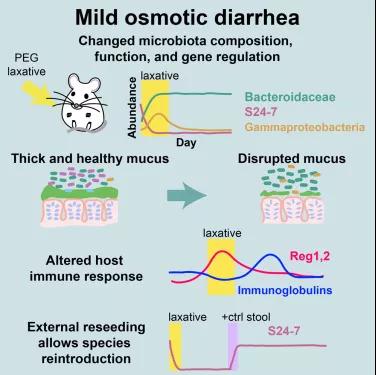Laxatives affect intestinal flora and cause long-term changes | Cell
June 21, 2018 Source: Biological Exploration
Window._bd_share_config={ "common":{ "bdSnsKey":{ },"bdText":"","bdMini":"2","bdMiniList":false,"bdPic":"","bdStyle":" 0","bdSize":"16"},"share":{ }};with(document)0[(getElementsByTagName('head')[0]||body).appendChild(createElement('script')) .src='http://bdimg.share.baidu.com/static/api/js/share.js?v=89860593.js?cdnversion='+~(-new Date()/36e5)];"In addition to diarrhea, over-the-counter laxatives can have a lasting effect on the gut flora and the host's immune system" - this is the conclusion of an article published in the June issue of the journal Cell. Scientists have used mice as a model to find that the composition of microorganisms and immune system has changed greatly within one week of taking laxatives.

A section of the mouse gut imaged with confocal microscopy.
Mouse epithelial nuclei are labeled in blue, the mucus layer in green, and bacteria in yellow and red.
The large, yellow and golden structures are food fibers. The mucus is thick and continuous as this mouse was not experiencing diarrhea.
CAROLINA TROPINI, SONNENBURG LAB, STANFORD UNIVERSITY
When the author of the article, Dr. Carolina Tropini, a postdoctoral fellow at the Justin Sonnenburg Laboratory at Stanford University School of Medicine, was still pursuing a Ph.D., he noticed that some bacteria were affected by osmotic pressure, and once the environment returned to normal, the bacteria would start breeding again.
Intestinal microbes in the human body often face different concentrations of solution, and drugs such as Miralax that relieve constipation will bring more water into the intestine, causing osmotic shock to "resident" microorganisms. Osmotic diarrhea is a pandemic caused by food intolerance, malabsorption, and the use of large amounts of laxatives. Tropini is curious as to how microbes respond to more dramatic environmental changes and how these reactions further affect the host.

DOI: https://doi.org/10.1016/j.cell.2018.05.008
01 , laxatives change intestinal flora
To understand the confusion, Tropin and colleagues added Miralax, which causes diarrhea, to the water of both groups of mice for 6 days. The two groups of mice were sterile mice transplanted with human intestinal microbes and mice with normal microorganisms.
It was found that the composition of intestinal microflora varied greatly before, during and after treatment, such as S24-7 in a group of mice (a very abundant family of microorganisms, almost exclusively present in thermostats). The animal's intestines were almost extinct after taking laxatives for 3 days and did not recover after treatment. The S24-7 flora is responsible for fermenting carbohydrates, accounting for nearly half of the mouse intestinal bacteria.
In a follow-up in vitro trial, the team found that S24-7 stopped growing in high concentrations of salt, sugar alcohol, and polyethylene glycol (the main component of Miralax).
Tropini said: "In general, everyone thinks that the effects of diarrhea are limited to the time of taking laxatives or symptoms, but we need to think more carefully about some over-the-counter drugs because they may have other important effects on the gut ecosystem."

The effect of diarrhea on the intestines and flora, image source: Cell
02 , diarrhea activates the immune system
When the mouse diarrhea, the mucus layer in the intestine becomes thinner, but it can completely recover within two weeks after the end of the symptoms. In addition, the intestinal wall cells will also change, and they can also return to normal. Previous studies have shown that changes in the mucus layer may affect the host's immune system.
In the new study, the scientists found that mice with only three gut bacteria produced antibodies against gut microbes after taking laxatives, while untreated control mice did not produce similar antibodies. This suggests that the mouse's immune system is activated during diarrhea. Moreover, the response of the immune system to certain microorganisms will last for more than two weeks.
Next, the research team will investigate whether laxatives will affect humans in the same way and clarify the duration of these changes. This helps to resolve the relationship between changes in the microbiota and patients with diarrhea, such as patients with irritable bowel syndrome.
References: 1) Laxative Causes Long-Term Changes to Mouse Microbiome
Hidden Safe Box,Bedroom Safe Box,Intelligent Safe Box,Cash Box
Hebei Yingbo Safe Boxes Co.,Ltd , https://www.ybsafebox.com